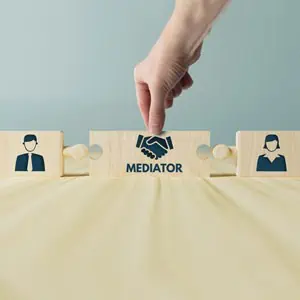
What Is Mediation And Who Is The Mediator?
Mediation is a process where two (or very rarely, three or more) parties will meet with a neutral person to help them come to an agreement. Most of the time that’s an attorney, though it technically does not have to be one. The parties are free to use anyone who is certified to be a mediator.
It is generally recommended, however, that the mediator be an attorney with at least some experience in the specific legal issues at stake in the dispute they are helping to resolve. This will ensure that they are aware of the stakes and issues involved.
What Is The Role Of A Mediator In Family Law In New York State?
Mediation is all about reaching an agreement without having to go through the time and expense of court. By negotiating through the neutral third party, the mediator, individuals are able to come to a compromise they can both agree on and proceed with the family law matter at stake. The mediator does not necessarily replace the need for a lawyer of your own, nor will they handle the majority of the procedural aspects of the divorce case itself.
For example, let us say you hire a mediator to do a divorce settlement. The mediator will not actually file the divorce case in court. Nor will they draft the “judgment package,” which includes the judgment of divorce terminating the marriage. Instead, the mediator will draft what’s called the settlement agreement (a/k/a “stipulation of settlement”) – or a separation agreement if you are not ready to proceed with the divorce.
In addition, they will walk you through all of the issues at stake in the case, such as…
- Child custody,
- Child support,
- Child visitation,
- Asset distribution,
- Property distribution,
- Debt distribution, and
- More.
After going over the issues at stake in your case, they will present you with a menu of options. Once they have found options that both parties can agree on, which can sometimes take several rounds of negotiation, and more rarely, several mediation sessions, they will produce the agreement you have settled on.
What Are Parent Coordinators And Parent Facilitators In New York State?
Divorce is always a difficult time, doubly so for parents. That is why some will call on the services of a parent coordinator to help handle some of the touchier topics.
A parent coordinator or facilitator, however, is not the same as a mediator. Unlike a divorce mediator, a parent coordinator is only allowed to discuss matters of child custody and visitation. On the other hand, unlike a mediator, the coordinator’s role can be more proactive and they can make strong recommendations, rather than just listening and helping the parents arrive at a compromise by themselves.
That said, the role of a parent coordinator is limited. Unlike a mediator, they cannot help with any financial issues whatsoever. So if child support, alimony, or asset distribution comes up during the discussion, they will not be equipped to handle that at all. The other main limitation is that the parent coordinator or facilitator’s role is dependent on the initial divorce settlement agreement between the parents.
What Issues Or Conflicts Do Parent Coordinators Address In Family Law Cases?
Parent coordinators, sometimes also called facilitators, are trained attorneys and mediators who help make suggestions for solutions to some of the delicate or thorny problems which emerge after a divorce.
Most of the time, a parent coordinator is going to be called in for joint custody issues. These are the decisions that come up regularly in the life of the child, but which their parents disagree over. For instance, medical decisions, educational decisions, and extracurricular activity decisions could all be the source of conflicts and are common issues that parent coordinators will deal with. More rarely, a parent coordinator may even have to deal with access issues.
Let us consider a couple of examples. In one post-divorce settlement agreement, the wording is unclear on an aspect of joint custody such as failing to specify particular pickup and drop-off locations for regular visits. And the parents end up with issues, questions, or conflict about what happens if the child is off from school and the agreement does not address that. Another family might be arguing over what happens during summer vacation when their agreement does not address that.
These are the kind of issues where a parent coordinator can step in and guide the parties through the process of solving them. Depending on the wording of the divorce settlement agreement, the parent coordinator may also be empowered to make the decision themselves.
While some might consider that presumptive, it can certainly allow for a faster and less conflictual resolution. In addition, even if so empowered, such a determination is not permanent. Either parent can appeal if they adamantly disagree with a recommendation to the parent coordinator, though doing so does require going to court.
More Information

Call Now To Schedule A 20-minute Case Assessment
Or Full 50-minute Case Strategy Consultation!
(347) 797-1188 | (914) 362-3080

